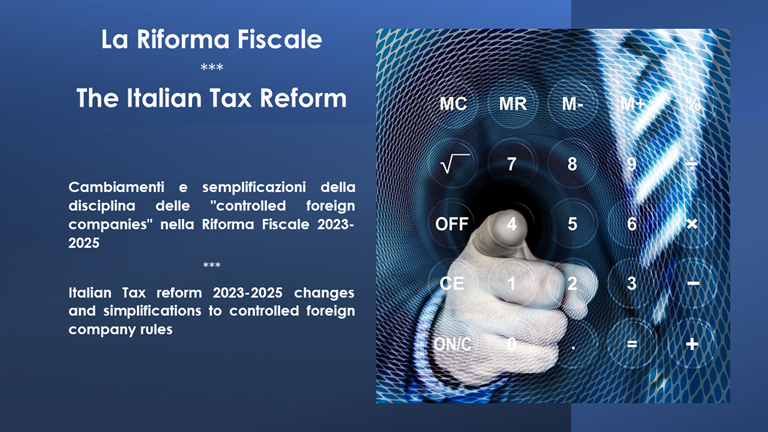

The amendment became necessary due to the implementation of the so-called Global Minimum Tax, in line with the provisions drawn up by the OECD under Pillar 2, according to which, for companies belonging to large national or multinational groups falling under the so-called ‘GloBe Rules’, an effective taxation rate of at least 15% must be guaranteed in all the jurisdictions in which each entity belonging to the group is present.
The objective of the delegated legislator is to simplify the calculation of the effective taxation of the non-resident controlled company by identifying in the 15% threshold the limit below which the non-resident company will be considered ‘black’ for the purposes of applying the CFC rules. For the calculation of the ETR, the use of the accounting data of the foreign controlled entity will be allowed, under certain conditions.
Article 3 of the draft decree, under the heading ‘simplification of the discipline of controlled foreign companies’, provides for the amendment of the current wording of Article 167, paragraph 4, letter a) Tuir, by providing that the CFC discipline will apply if the controlled foreign companies ‘are subject to effective taxation of less than 15%‘. The calculation of effective taxation is equal to the ratio between the sum of current taxes payable and deferred tax assets and liabilities recognised in the financial statements of the non-resident subsidiary and the pre-tax profit resulting from those financial statements.
As a result of the amendment on the recalculation of the effective tax rate, it will no longer be necessary to calculate the virtual taxation, i.e., the level of taxation to which the foreign entity would have been subject had it been resident in Italy.
The simplified rules for the calculation of the ETR, however, may only be applied with respect to foreign subsidiaries whose financial statements are audited and certified by professionals authorised in the foreign State and whose results are used by the auditor of the controlling entity for the purposes of the opinion on its financial statements, whether statutory or consolidated.
In the absence of audited financial statements, the parent companies will have to calculate the ETR test for the foreign subsidiary in accordance with the rules currently in force, i.e. by verifying that the non-resident controlled entities are subject to an effective taxation less than half of that to which they would be subject if resident in Italy.
The draft decree also provides for the introduction of paragraph 4-bis within Article 167 Tuir, according to which, for the calculation of the effective tax rate at 15%, the equivalent national minimum tax referred to in Annex A of the decree implementing Directive (EU) 2022/2523, possibly paid by the foreign subsidiary, will also be taken into account.
The reference is precisely to the aforementioned Global Minimum Tax which, since it applies, as mentioned, on a jurisdictional basis, to all the controlled companies located in the same State, for the purposes of the allocation of the share of the tax to the individual foreign controlled company, it is provided that such tax will be recognised to the extent corresponding to the product between the national minimum tax itself and the ratio of the excess profits to the enterprises and entities of the group subject to the national minimum equivalent tax calculated on a unitary basis with the non-resident controlled company.
Lastly, the draft legislative decree provides for the introduction of a new paragraph 4-ter, by virtue of which resident parent companies are allowed to avoid the complexity of calculating the ETR of their subsidiaries or foreign permanent establishments by opting for the payment of a substitute IRES tax equal to 15% of the net accounting profit for the year calculated without taking into account the taxes paid by the foreign subsidiary, the write-down of assets and the provisions for risks. The option for the substitute tax will last for three financial years of the parent company and will be irrevocable. At the end of the three-year period, the option will be deemed to be tacitly renewed for a further three years, unless revoked (a specific provision will set forth the procedures for communicating and revoking the option). The optional mechanism will always be recognised, however, provided that the financial statements of the non-resident subsidiaries are audited and certified by professionals certified in the subsidiary’s state of residence and whose findings are used by the parent company’s auditor to express its opinion on its annual or consolidated financial statements.
Our firm’s corporate team will continue to monitor future developments in the discipline and would be pleased to offer further information and specific insights for those interested.








